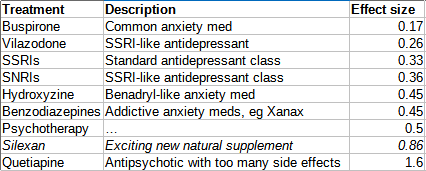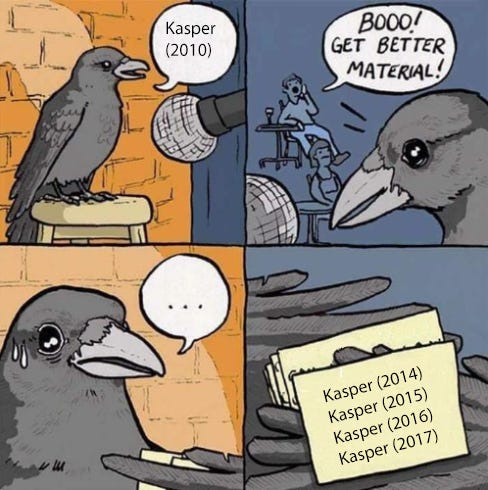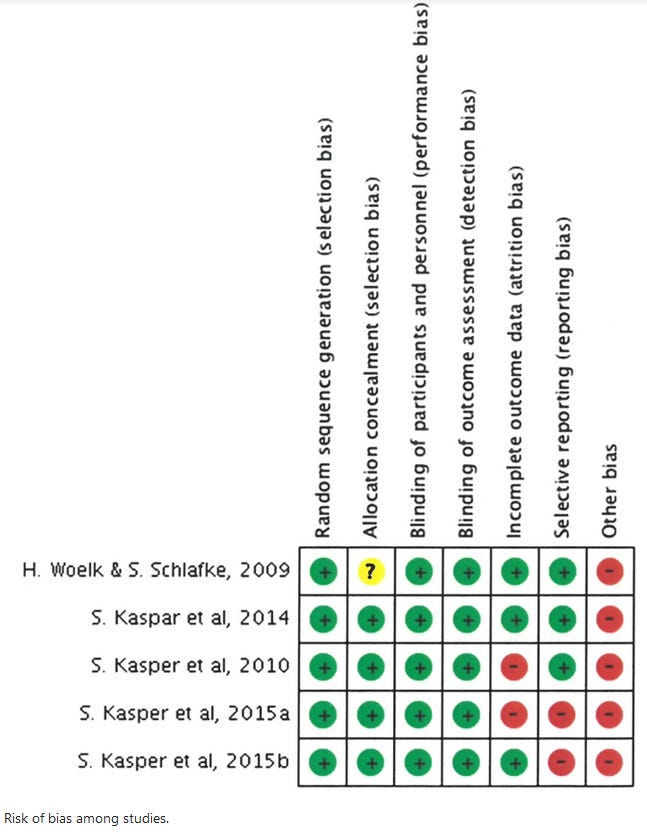Lavender's Game: Silexan For Anxiety
1: What is silexan?
There are dozens of natural supplements that purport to treat anxiety. Most have a few small sketchy studies backing them up. Together, they form a big amorphous mass of claims that nobody has the patience to sift through or care about.
But recently silexan (derived from lavender) has started to stand out of the crowd. Daily Mail had an interview with psychiatry professor Hans-Peter Volz, who said that silexan should be first-line for anxiety, replacing things like SSRIs and Xanax. And a very reputable professional publication within psychiatry, The Carlat Report , published an article and a podcast touting silexan:
Not many treatments in psychiatry have a large effect size. There’s stimulants for ADHD, ketamine for depression . . . and now Silexan for generalized anxiety disorder.
And:
Most [alternative medicine] therapies do not have robust effects, but Silexan is an exception. Consider it in adults with generalized anxiety disorder.
What’s going on?
Silexan is a branded extract of lavender oil created by Wilmar Schwabe GmbH, a German pharma company. Nobody is sure about the mechanism of action, but it probably involves serotonin 1A receptors, the same receptors blocked by mediocre anti-anxiety medication buspirone and some of the newer antidepressants.
Studies claim it to be highly effective against anxiety conditions. Carlat Report offers us the following data (table layout is mine):
Before silexan, the anxiety landscape was:
-
SSRIs, which work fine, but only about half of people respond to them and some people have intolerable side effects.
-
Benzodiazepines, which work great, but are really addictive.
-
Quetiapine, which makes people so sleepy that they forget to be anxious, plus has various bad long-term side effects.
…plus some other things with even worse cost/benefit ratio that people rarely used.
Now people are saying that silexan works even better than benzodiazepines, doesn’t cause addiction, and has no major side effects! If true, this would change the world. SSRIs changed the world, and they’re nowhere near as impressive as silexan claims to be.
2: Is there evidence that it works?
Silexan has four meta-analyses, all of which show strong effects. But here’s a Venn diagram of the studies included in each analysis:
These four meta-analyses only have six studies among all of them, and five of them are by the same guy!
Also, Kasper is a co-author of two of the four meta-analyses.
Additionally, all six studies - the five Kaspers and Woelk - have conflicts of interest, in the sense of either directly being funded by Wilmar Schwabe (the pharma company producing silexan) or the researchers having gotten money from Schwabe. So do at least two of the four meta-analyses.
You might think I’m trying to write a hit job on silexan, but not really. The fact is, this is par for the course in the supplement world, and only a little unusual for any mental health treatment. Studies are expensive, and the natural funder (until big government agencies get involved) is the company marketing the drug. Usually there will only be one academic institution or team that’s really committed, and if it has a prestigious leader, his name will be on all of the papers.
Professor Kasper seems like as legitimate and respectable a researcher as you can get for these kinds of things: head of the Department of Psychiatry at the University of Vienna, chair of the World Psychiatric Association’s pharmacology branch, editor of three good journals, various important and influential papers. Sure, he’s gotten “grants/research support, consulting fees and/or honoraria” from Schwabe. But he’s also gotten money from “Angelini, AOP Orphan Pharmaceuticals AG, AstraZeneca, Eli Lilly, Janssen, KRKA-Pharma, Lundbeck, Neuraxpharm, Pfizer, Pierre Fabre . . . and Servier”, and you don’t see him writing nearly as many glowing papers about their drugs. High-level academic psychiatrists academics are usually working with a bunch of drug companies and getting paid for that work, and this isn’t usually considered disqualifying to their credibility.
So fine, let’s look at the studies. A typical example is Kaspar (2014), Lavender oil preparation Silexan is effective in generalized anxiety disorder. It has 539 people, which is really quite impressive - usually these kinds of supplement trials would have more like 10% of that. The study is double-blind (patients don’t know if they’re getting silexan or placebo, and doctors don’t know which one they’re giving) and they made sure the placebo capsules smelled like lavender (a nice touch!) The groups were randomized carefully, but there were some statistically significant random differences between them; none of them seemed too worrying to me but your opinion might differ. There was a clear, obvious, and dose-dependent effect of silexan vs. placebo (p < 0.001) on seven of eight outcomes measured; the eighth was “physical health” and it’s fine if an anxiety drug doesn’t help with this (although you could always hope it would relieve some ailments by making people less stressed). It did significantly better than paroxetine, which only reached statistically significant effect size on about half of the outcomes (par for the course in these kinds of studies, SSRIs are kind of weak). Effect size was 0.37 for the 80 mg dose, and 0.5 for the 160 mg dose.
(Where did Carlat Report’s 0.86 effect size come from? Supposedly from the Generoso meta-analysis’s sub-analysis of only GAD patients, but I can’t for the life of me retrace how they got that number.)
This is a pretty good study. Large sample size, professionally done, strong consistent results. Yap (2019), one of the two independent meta-analyses, basically agrees, finding no red flags except “other bias”, ie it was funded by the drug company:
So aside from the really obvious problem, there are no gaping problems here.
(and other than that, Mrs. Lincoln, how did you like the play?)
3: What about circumstantial evidence?
Along with the big official studies, there are a few other reasons we might expect silexan to work.
First, it works well in animal studies. Sure, everything works well in animal studies, and sure, these animal studies were also sponsored by Wilmar Schwabe, but whatever, I already said it was only circumstantial evidence.
Second, the anecdotal evidence seems really good. In the Carlat article, editor Dr. Chris Aiken writes:
I started recommending Silexan in 2016 and have treated 505 patients with it, most with GAD or a mood disorder with anxious distress. My experience has been in line with the research, with the best results in pure [generalized anxiety disorder]. Most patients were taking long-term benzos, and many spontaneously reduced their benzo dose on their own after starting it. Patients often forget to reorder Silexan, and when they come off it, it usually takes a few months for the anxiety to return. The change is so gradual that many don’t notice it. This is where careful tracking with rating scales (which can be as simple as having patients rate their anxiety from 1–10) and trials on and off Silexan come in handy.
I’ve tried it on about six patients, without keeping careful records. Two of them found it very effective, another found it somewhat effective, and three others didn’t find it helped much. I also tried it myself - I didn’t notice much effect, but I’m not that anxious at baseline, so whatever. This seems about average for supplements, maybe a little better.
The nootropics community seems pretty excited about it. See eg Lavender/Silexan Has Been Astounding and Highly Recommend Silexan Lavender For Anxiety on r/nootropics. But the nootropics community is always getting pretty excited about things. As far as I know nobody’s included it in any formal community surveys, including me.
Finally, there are lots of studies on lavender aromatherapy. Aromatherapy sounds a bit silly, but the key idea is that the active ingredient in silexan is volatile and either acts at olfactory neurons (what? is this a real thing?) or can be absorbed intranasally (definitely a real thing, although I don’t know what to think about this supposed delivery mechanism). A meta-analysis of 37 RCTs of lavender, mostly aromatherapy-based, found strong effects but admitted most trials were low-quality.
There seems to be a bit of a fight going on between people who think lavender has some sort of olfactory-specific mechanism and people who think it’s just a normal drug which can sometimes be intranasally absorbed. For example, here’s a New York Times article highlighting Japanese research showing that lavender makes mice less anxious, unless you genetically engineer them to have no sense of smell, in which case it doesn’t work. Some of these people even think the reason silexan works is because you swallow the capsule, the lavender smell seeps out as you digest it, and then you inhale it from your own throat. On the other hand, here’s a contrary study showing that mice genetically engineered to lack smell still respond to lavender normally. My bias is towards skepticism of the smell-based stuff; I’m guessing it’s just ordinary absorption.
4: If you were going to take it, what would you do?
When my patients are interested in trying silexan, I refer them to this brand, which is the same as the one in the Kasper studies. The studies suggest that 160 mg (two pills) once a day work better than 80 mg (one pill) once a day.
Reports conflict on whether it works immediately, or “builds up” over a few weeks. Many of the anecdotal reports say they feel better within the first hour, and the aromatherapy studies are also done on the assumption that the substance works immediately. But Aiken says only that patients start to feel improved after a week, and some of the studies don’t show separation from placebo until after a month. I have no priors on this one: benzodiazepines work immediately, SSRIs take a month, and silexan has been compared to both. I’d recommend trying it for a few weeks just to be sure you’re not missing anything.
The most common side effects are upset stomach, nausea, and burps that taste like lavender. I was able to avoid the last one by putting the silexan softgel in a capsule, but I don’t know if this is okay: it might ruin the absorption - and remember that according to the aromatherapy people, the weird lavender-smelling burps are part of the mechanism of action! Silexan might cause miscarriage during pregnancy, and pregnant people should avoid it until this has been investigated better.
Studies have established pretty conclusively that there is no addiction risk - this study actually went so far as to give it to known drug addicts to see if they felt like abusing it; they did not. If it works for you, there’s no known reason not to take it forever, although this kind of statement has a habit of crashing and burning later.
5: Conclusions?
Everything looks amazing about silexan, except the part where all the good studies are by one guy taking money from the drug company.
I go back and forth on how much to worry about this, in the context of other anecdotal evidence for efficacy.
I think a really obvious conclusion is that someone else needs to study silexan, independently. This is within the abilities of an ambitious medical student or resident. Do a poster presentation on it or something.
Otherwise, should you take silexan if you’re anxious? I default to yes. It’s $12 for a two-week trial, which should make it pretty clear whether it works for you or not (might it be placebo? I’m not sure how to even think about the difference between a placebo anxiety cure and a real anxiety cure). Risk is low, and if it saves you from a course of SSRIs or benzos it’s probably worth it.
In case that sounds like a total cop-out, here’s an even bigger one: 50% chance personal prediction that, when independent studies are done, silexan will have an effect size equal to or greater than SSRIs for anxiety (ie 0.3)



